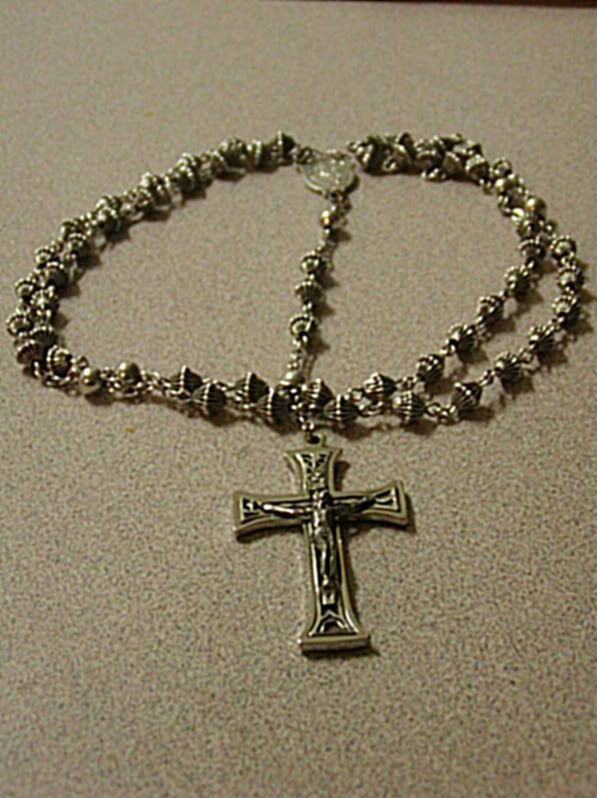When my Grandfather died in March and my aunt was dividing up his belongings, I received his rosary and wall crucifix. Here is a picture of his rosary.

When I received it I felt honored; I think it had once been mentioned that I should get it when he passed away and rosaries tend to mean a lot to people. I decided that since I now had one perhaps I should learn how to pray it.
I then started to wonder if the Episcopal/Anglican church uses rosaries, especially since the two Churches are so similar. It turns out that they do and I now have an Anglican rosary.

The structure is different from the traditional Catholic rosary. There is the cross and then 33 beads in all (four sets of 7 "week" beads, 4 cruciform beads, and an invitatory bead). A full explanation of the symbolism is here. I don't focus on Marian devotion so much (neither do all Catholics for that matter, there are other Catholic rosary forms). There are no set prayers with the Anglican rosary but rather suggestions that can be mix and matched. I'm changing my prayers to reflect the liturgical seasons though...tomorrow starts Advent. In any case, I find using a rosary to be helpful in ordering my prayers.
In my "Sex and Gender in American Religion" seminar, we have spent some time talking and reading about Catholic convents and the Protestant detestation of them. It was then that I remembered that there was a nun in my family. And so I went looking for Sister Caroline’s information because of my class readings and because I recently decided to join a local New Monastic community through a local Episcopal Church. She was a member of the Apostles of the Sacred Heart of Jesus in Hamden, Connecticut. She entered religious life in 1941 and died, still in the Order, in 1995. It's heartening to know that I'm treading a path that has already been traveled in my family.
So, heirlooms and history help me connect to a style of worship that feels more familiar and meaningful to me.
And recently I have been thinking about what Protestantism lost in the effort to separate itself from a Catholic style of worship. My reflections on this comes from my experience in the Baptist church I attended.
1) The liturgical calendar. In the Baptist Church, there was Christmas and Easter. We seemed focused on Jesus' birth and death but the rest was not as important.
2) the Lectionary. The pastors I grew up listening to, well, there never seemed to be a method to the madness. With the lectionary, there is a system of readings from the Bible and, in most cases, priests use sermons to elaborate on these readings. It is more holistic than the preacher who picks a verse or five and connects them without regard to context. The lectionary system also helps me remember the content of the sermon. I fankly do not remember much of what my old preacher said. I remember him (or another Baptist preacher) talk about sins of commisssion and ommission, that the Palestinians should read the Bible and realize the the land belongs to the Israelis, and that celebrating Halloween will send me to Hell. That's it; I don't remember much else.
3) Good works vs. Faith. Southern Baptists follow sola fide with a passion, to the point at which they said that Catholics would go to Hell because they only cared about works. I agree that faith is important (correct doctrine is fuzzier) but there must also be works. We are called to works (Matthew 25:31-46) and I think the focus on Jesus' death obscures that for the Baptists.
_____
Correction: Tomorrow is Christ the King; Next Sunday starts Advent.
No comments:
Post a Comment